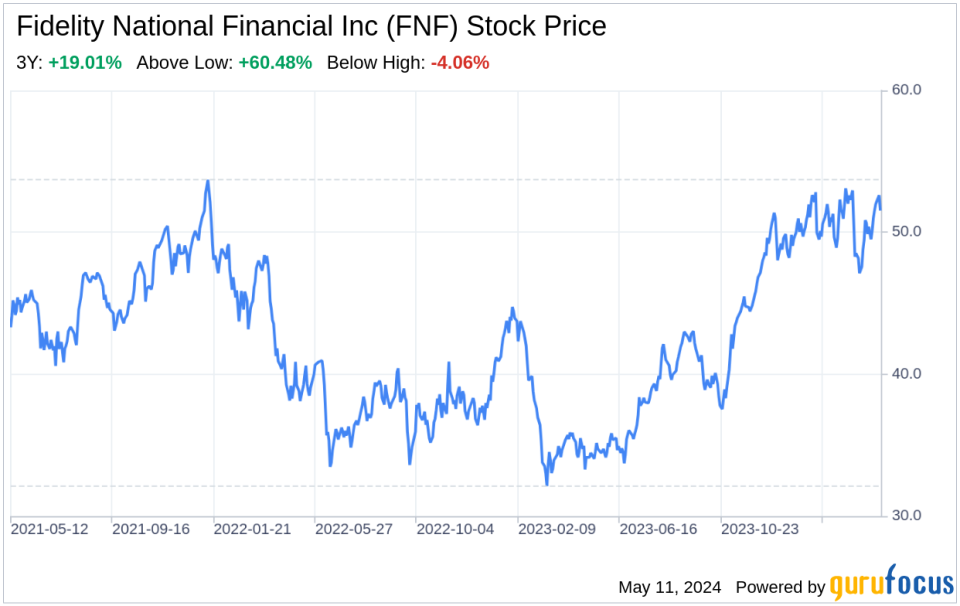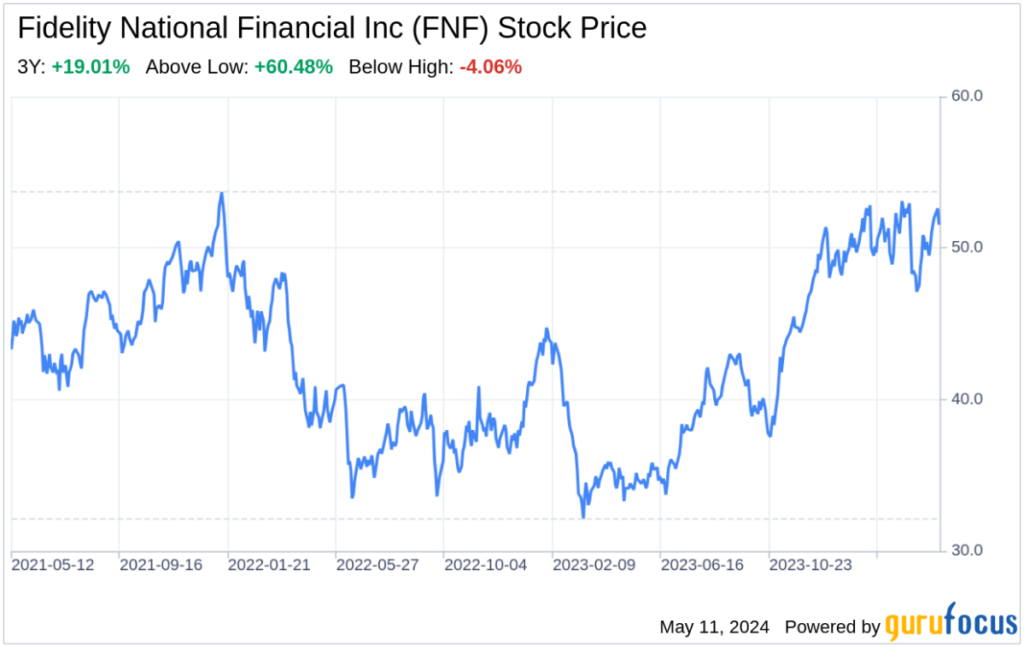-
Solid revenue growth and significant increase in net income.
-
It has a strong market presence in title insurance and the growing annuity and life insurance sectors.
-
Changes in the real estate market and challenges in the interest rate environment.
-
Opportunities for technology integration and demographic change.
On May 10, 2024, Fidelity National Financial, Inc. (NYSE:FNF) filed its 10th quarter report, providing detailed financial results for the first quarter of this year. The company, a leading provider of title insurance, escrow, and other title-related services, reported a significant increase in total revenue from $2.474 billion in the first quarter of 2023 to $3.299 billion in the first quarter of 2024. was shown. Net income attributable to common shareholders also improved significantly. , from a loss of $59 million in the first quarter of 2023 to a profit of $248 million in the first quarter of 2024. This financial overview shows FNF's strong financial position and prepares us for a comprehensive SWOT analysis.


Strengths
Market leadership and revenue growth: FNF's dominant position in the title insurance market is a testament to its brand strength and operational efficiency. The company's revenue growth clearly demonstrates its competitive advantage, as evidenced by its latest SEC filings. With direct title premiums increasing from $428 million to $440 million year over year and agency title premiums increasing from $550 million to $593 million, FNF We have demonstrated our ability to expand our share and leverage industry demand.
Financial robustness: The strong year-over-year increase in net income from a loss of $88 million to a profit of $269 million reflects FNF's financial resilience. This recovery included a significant increase in escrow, title-related and other fees from $880 million to $1.281 billion, and solid investment income from $611 million to $710 million. Supported by diversification of revenue sources. The company's strong balance sheet positions it well to navigate market uncertainties and invest in strategic initiatives.
Weakness
Dependence on real estate market: FNF's performance is closely related to the cyclically fluctuating real estate market. SEC filings highlight the impact of residential real estate activity on title insurance income, indicating potential vulnerability to economic downturns and changes in mortgage rates. This dependence on external market conditions can create challenges in maintaining revenue consistency.
Operating costs: Despite the increase in revenue, FNF's operating costs have also increased, with payroll costs from $677 million to $727 million and agent fees from $420 million to $460 million year over year. increased to dollars. These increased expenses can put pressure on profit margins, particularly in a competitive environment where cost efficiency is critical to remaining competitive.
opportunity
Advances in technology: The investment in FNF's real estate technology subsidiary provides an opportunity to innovate and streamline operations. Implementing digital solutions improves customer experience, improves process efficiency, and opens new revenue channels. As the industry evolves toward further technology integration, FNF's proactive stance could lead to a stronger market position and improved profitability.
Demographic trends: The aging U.S. population and increasing demand for retirement planning products provides significant growth potential for FNF's F&G division. With a portfolio that includes pension and life insurance products, FNF is well-positioned to capitalize on the needs of the 'baby boomer' generation, which could drive long-term earnings growth for the sector.
threat
Interest rate fluctuation: SEC filings indicate that FNF's F&G division's products, such as fixed-rate annuities, are sensitive to the interest rate environment. A low interest rate environment can have a negative impact on earnings, as reserves require a guaranteed minimum credit rate. Conversely, rising interest rates may cause policyholders to seek alternative investments, which may impact FNF's earnings and cash flows.
Market volatility: FNF is exposed to geopolitical uncertainty as well as real estate market volatility, which poses a threat to the title insurance sector. The application notes the impact of factors such as housing inventory, home prices, and mortgage financing on residential real estate activity. These external risks can lead to volatility in earnings and may require strategic adjustments to FNF's business model.
In conclusion, Fidelity National Financial, Inc. (NYSE:FNF) has demonstrated solid financial performance with significant revenue growth and market leadership in the title insurance sector. However, dependence on the real estate market and operating costs are areas that require careful management. Technological advances and demographic opportunities provide avenues for expansion, while threats from interest rate fluctuations and market volatility must be strategically mitigated. Overall, FNF's strategic positioning and forward-looking initiatives suggest strong potential for continued success in the financial industry.
This article created by GuruFocus is intended to provide general insight and is not intended as financial advice. Our commentary is based on historical data and analyst forecasts using an unbiased methodology and is not intended to serve as specific investment guidance. It does not constitute a recommendation to buy or sell stocks, and does not take into account your individual investment objectives or financial situation. Our objective is to provide fundamental data-driven analysis over time. Please note that our analysis may not incorporate the latest announcements or qualitative information from price-sensitive companies. GuruFocus has no position in the stocks mentioned herein.
This article first appeared on GuruFocus.


